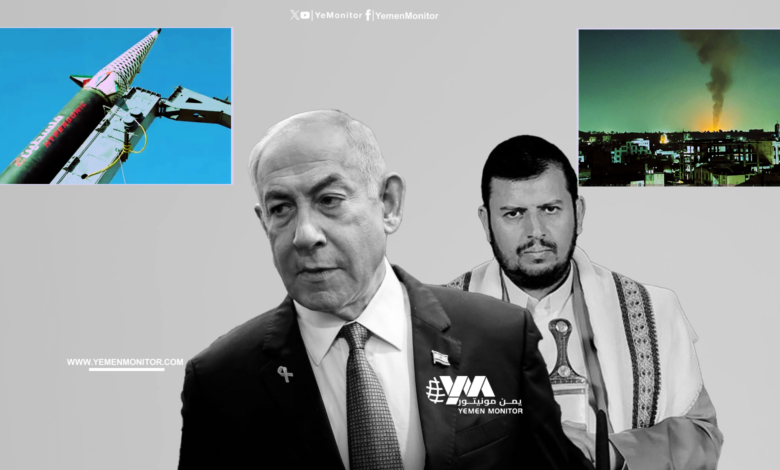Amidst the Houthi-Israeli Escalation: Is Yemen Paying the Price?

By /Mareb al-Ward
Israeli leaders are threatening to turn the Yemeni provinces of Sana’a and Hodeidah into devastated areas like Gaza and Lebanon in response to the missile attacks carried out by the Houthis, increasing fears of Yemen entering a new phase of conflict that could have catastrophic consequences for the people and infrastructure.
This dangerous escalation calls for a clear and decisive stance from the internationally recognized Yemeni government and requires the Houthis to reassess their options to avoid unbearable consequences and to consider domestic priorities, foremost of which is peace.
The experiences of Gaza and Lebanon demonstrate that the entity does not hesitate to target civilians and infrastructure, emboldened by unlimited US support. With the complexity of the geopolitical scene and the decline of Iranian influence in the region, the Israeli entity’s objectives are expanding to include reshaping the “map of the Middle East” beyond the confrontation with the Iran axis, which increases the risks for Yemen.
Despite the seriousness of the situation, the Houthis continue their missile attacks, without considering their increasingly negative consequences for Yemen, as well as not assessing their effectiveness for Palestine, especially since their operations have not been effective in alleviating the military pressure on Gaza, according to expert assessments.
The Houthis must ask themselves some important questions: Have their attacks changed the military situation in Gaza? Can such operations justify the heavy cost that the Yemeni people may bear? Should the priority be to support the Palestinian resistance or to avoid the complete destruction of Yemen, especially after the entity’s leadership threatened to launch extensive attacks to destroy cities?
The real problem is that the Houthis deal with their military operations without a realistic assessment, relying on inaccurate references. For example, they take the positions of the Palestinian resistance to prove the effectiveness of their operations, ignoring the fact that these positions often come as an expression of a feeling of betrayal or a need for support, even if it is symbolic.
When criticized, they respond by saying, “Should we believe you or believe the people on the ground?” in an attempt to legitimize their actions, although this logic lacks a strong basis, as the support of the resistance for any party is often merely a moral appreciation, not evidence of a tangible impact.
One of the most prominent justifications that the Houthis promote to prove their ability to confront major powers such as US, Britain, and Israel is their claim that they have withstood a broad military coalition, although most of the countries participating in the Arab coalition limited their participation to limited airstrikes. Moreover, the continued presence of the Houthis in Sana’a is primarily due to the coalition’s calculations and mismanagement, along with the leadership of the legitimacy, and not to their own strength.
The Houthis’ assertion that they can defeat the US and Israel reflects a reckless disregard for their country’s well-being. There is no comparison between their military capabilities and those of global superpowers. Even their powerful allies like Hezbollah have been defeated or significantly weakened. However, it must be acknowledged that the US and British military approach to the Houthis in response to their attacks on maritime navigation may have fueled their overconfidence.
Furthermore, the Houthis exhibit a blatant disregard for the potential of an Israeli aggression against Yemen. For instance, they argue that the country is already devastated by war, implying that any additional attacks would be inconsequential. This narrow perspective ignores the catastrophic consequences that could befall the country if the conflict escalates.
The Houthis must realize that claiming religious duty imposes a greater responsibility on them to protect their homeland first. If their intervention “for Gaza” has not made a tangible difference in the Palestinian reality but has begun to negatively impact Yemen, is it logical to continue on this path? Or would it be wiser for them to retreat to preserve their country and spare it further destruction?
The argument put forward by the Houthis that their attacks represent the will of the Yemeni people is inaccurate. Many participants in their gatherings support the Palestinian cause but do not necessarily agree with their political or military choices. Moreover, fateful decisions such as conducting military operations abroad should be made by a legitimate authority representing the people, which the Houthis currently lack.
The Houthis should understand that questioning the effectiveness of their operations does not mean rejecting the support for Palestinians nor does it make those who ask such questions “Zionists,” as they like to label them. Rather, it aims to assess the results of their intervention. If these attacks have not brought about any positive change in the Palestinian reality, is it wise to continue at the expense of a country that is still suffering from war and its consequences?
Based on the foregoing, the Houthi motivations for continued escalation can be summarized as follows:
- Seeking international recognition: The Houthis aim to gain international recognition for their rule by launching attacks that impact regional and international interests.
- Boosting domestic popularity: By exploiting the Palestinian cause, the Houthis seek to gain domestic and regional political support.
- External Targeting Strategy: The Houthis rely on an external targeting strategy against the government. The events following the truce with the Arab coalition led by Saudi Arabia demonstrated their inability to use “the pretext of aggression” to justify their repressive policies domestically. Therefore, the Gaza war provided an opportunity to rescue them from public discontent, as indicated by one of their leaders. They capitalized on this opportunity by recruiting individuals and organizing weekly demonstrations, presenting these crowds as evidence of their popular support while actually mobilizing them under the banner of supporting Palestine.
- Aligning with Iran’s regional strategy: Following the Gaza war, Iran found itself in a predicament regarding the slogan of “unity of fronts.” It encouraged the Houthis to participate to alleviate the embarrassment, recognizing that their contribution would be ineffective given the geographical distance and the Israeli entity’s ability to counter drones and missiles.
These developments place a significant responsibility on the internationally recognized Yemeni government. It must clarify its position to the international community, highlighting that Israeli threats constitute a violation of international law, and work to mobilize support to regain control of the country. Additionally, the government must assert its authority and reject any claims that justify Israeli escalation.
The Houthis must abandon military adventures that drag Yemen into endless conflicts and contribute to the peace process with the same enthusiasm they show for war. Similarly, the government must fulfill its duty to restore authority and move away from relying on external actors, ultimately achieving a just peace for all.





